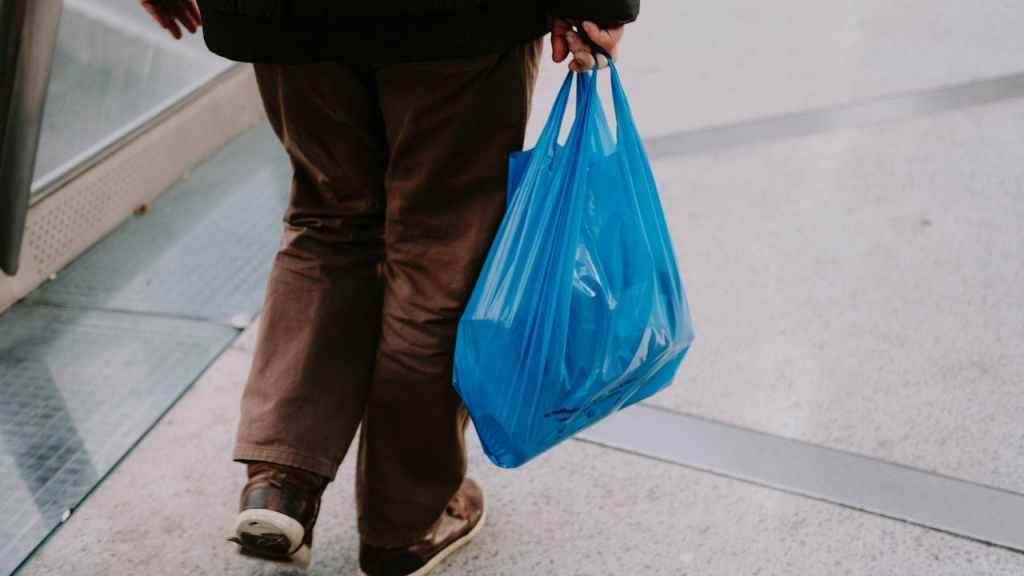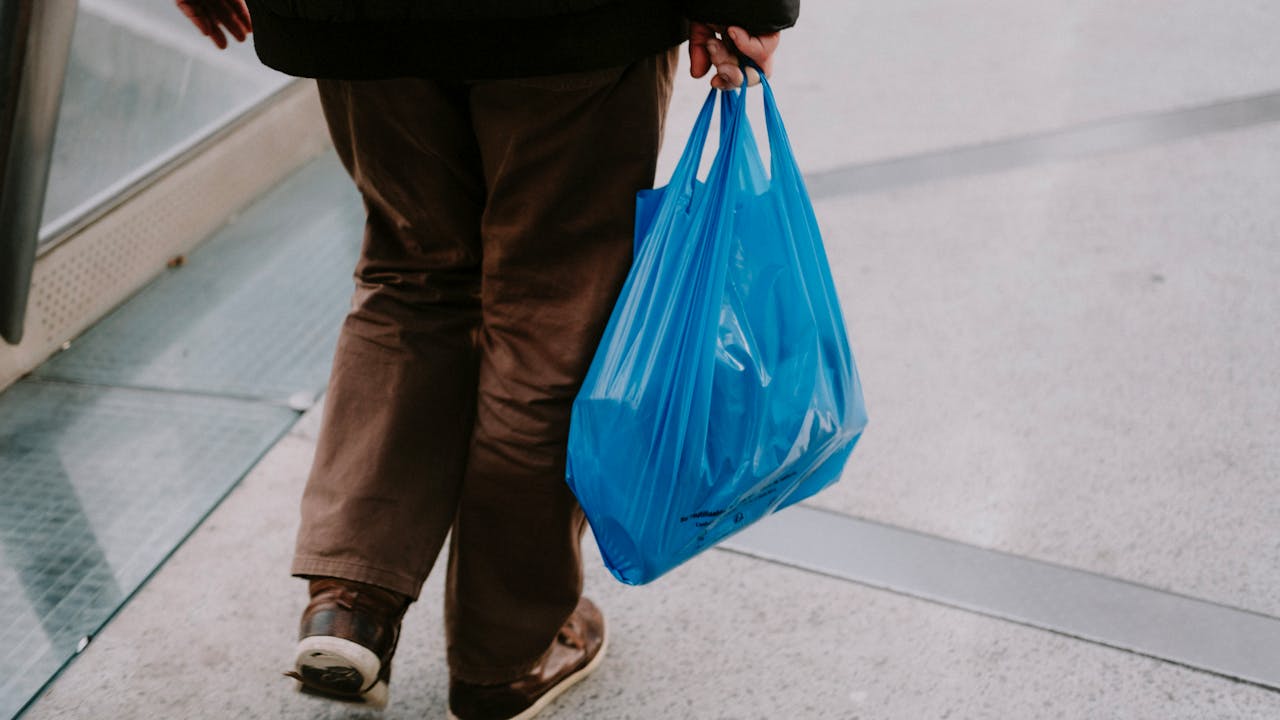
The modern, lightweight, plastic shopping bag with built-in handles was the invention of Swedish engineer Sten Gustaf Thulin, and was released into the world in 1965.
So was I.
I mean, I was released into the world in 1965. I was not the invention of Swedish engineer, as far as I know. And I don’t have convenient built-in carrying handles.
I am the same age as the plastic shopping bag.
A quick online search tells me that Thulin’s bag (which, fun fact: he apparently didn’t intend to be single-use; he thought it would help the environment by saving trees, since it could be used over and over unlike a paper bag) became widely popular in North American supermarkets in the late 1970s. This tallies with my memory: in my childhood, shopping came home in paper bags, but by the time I was in my teens, the plastic bag was king.
Its predecessor, the paper bag, had been shoppers’ go-to carryall in many places for nearly 100 years. Presumably before that, there was a time when people went to a shop or a market to buy stuff and just … brought their own bag, if they weren’t having things delivered to their house.
Sometimes I look around when I’m grocery shopping, or at the mall, and think about how something as dominant, as ubiquitous, as seemingly inevitable as the plastic shopping bag, has (at least where I live) disappeared quietly, almost without a trace.
Here in Newfoundland, the plastic shopping bag was banned in October 2020. There was some grumbling, but no serious resistance (presumably the serious resisters were at that point too busy protesting masks and gearing up to protest Covid vaccines, so maybe the timing was good).
People complained about forgetting their reusable bags and having to buy another reusable one, or a paper bag, from the store. But now, almost everyone just … carries shopping bags. People have adapted to having a tote or a shopping bag when they go to the store, without much fuss, and those old Sobeys bags that seemed as much a part of the landscape as rain, drizzle, and fog, simply … vanished.
On the whole, I think it’s a good thing, though the environmental benefits are mixed: there are probably way too many reusable bags in circulation, and they are more environmentally friendly to produce only if you use them over and over and over for years. (Admittedly, there are other benefits to banning the plastic ones, like not having them littered around everywhere and taking up space in landfills forever).
But what interests me about the rise and fall of plastic bags is not so much whether it benefits the environment long-term: what interests me is that it happened. And I outlived it. I was here before plastic bags (barely), and it looks like I’ll be here long after.
Which led me to thinking about what else I’ve outlived. People my age have seen the rise of so many new technologies, so many things that have been invented and started and discovered in our lifetimes (for better and for worse) that I don’t know if we think enough about the things that have ended in our lifetimes.
Smoking culture is a big one. Not that people have stopped smoking cigarettes entirely, but the cultural shift away from acceptable indoor smoking is huge. When I was in university, smoke hanging in the air of classrooms, meeting rooms, and cafes was so taken for granted, I doubt most of us non-smokers could ever have imagined that we’d one day have the upper hand, breathing unpolluted indoor air while the smokers huddled outside in the freezing cold wind. It’s a shift so total that it’s hard to even remember how things were before.
Huge changes happen in the bigger picture, too. Anyone born in 1965 probably remembers the same things I do, particularly the wild optimism of all the world changes that happened in the 1990s as we were maturing into full adulthood. The Berlin Wall falling; Communist governments being voted out or overthrown all over Eastern Europe. Nelson Mandela being freed from prison and then, months later, being elected president of South Africa. The Good Friday agreement in Northern Ireland. The sense that the world could be better, that seemingly intractable problems could be solved. Yes, there was genocide in Rwanda and civil war in the former Yugoslavia to puncture our newly born optimism – but it felt like maybe those things were the last gasp of the horrible, war-torn old world, and we were striding into something newer and better.
Well. We all know how that worked out.
All the same, the other day I was looking at an ad for some Canadian airline advertising nonstop flights to Belfast and my kneejerk reaction was “What? Who wants to go to Belfast?!??!” before I remembered that Belfast is not the Belfast I remember from the news stories of my youth, not car bombs and outbursts of sectarian violence anymore. That changed. That was a thing that I grew up hearing about that seemed normal — sort of like the constant, low-level, background thrum of assuming we’d probably all die in a nuclear bomb blast or its aftereffects — that just … went away.
Of course those things didn’t just go away, no matter how it seems now. Plastic bags and indoor smoking were banned after a lot of thought, activism, and effort — and people didn’t voluntarily give up either; legislation was required. The Berlin Wall may have fallen overnight, but the collapse of those Eastern European governments had been coming for a long time. Activism from both within and outside South Africa brought down apartheid; long and difficult negotiations and a referendum led to the Good Friday agreement. (I’ll admit, even without having visited Northern Ireland, I cried at that Derry Girls episode about the referendum, and I bet some of you did too).
And we can’t always guess in advance which way these cultural shifts are going to happen. In spring 2020 I wrote a blog post about cultural shifts and how our definition of “normal” changes. At the time, I wondered what post-Covid “normal” would be like. Some of the more positive changes I hoped for — normalizing mask-wearing when sick, more generous paid time off so people could stay home from work rather than spreading germs — emphatically did not become part of our “new normal.” But it looks like Zoom meetings are here to stay, so … there’s that, I guess.
So often, during the current heart-rending, gut-wrenching violence being perpetrated in Gaza, I hear people say “Well, Israel and Palestine, violence in the Middle East — it’s an intractable problem, it’s been that way forever, it’ll never be solved.”
Of course that’s not true — either end of the statement. Peaceful coexistence of Jews and Arabs in Israel/Palestine was possible under the Ottoman Empire; this “eternal conflict” is barely 100 years old. Not that the Ottoman Empire was some idyllic paradise (pretty great if you were a Sultan, I guess; not so much otherwise), but it’s a reminder that systems and conflicts that seem deep-rooted, eternal, and unchangeable do, in fact, change. Not without effort, resistance, compromise, discontent and sometimes violence — but things change. Little things like plastic bags; big things like forever wars that turn out not to last forever.
I want to have hope, to remember that we live in a world where things change. Sometimes, they change for the better.
Solving world conflicts is obviously more challenging than remembering to bring a tote bag to the grocery story — but it’s not impossible.


Thanks for this Trudy. It’s good to remember that war is also temporary.
Great post Jennifer and even though I older I still remember all those things and in some ways it does give meaning to “the good old days”.
We’ve also outlived the two dollar bill, and one dollar bill, along with the penny.